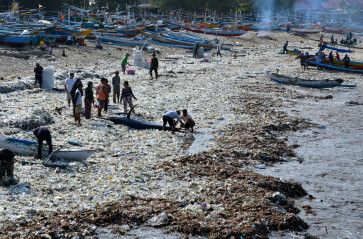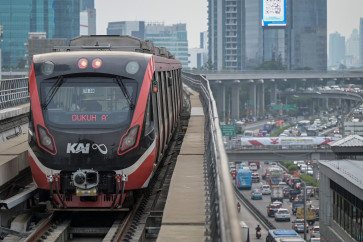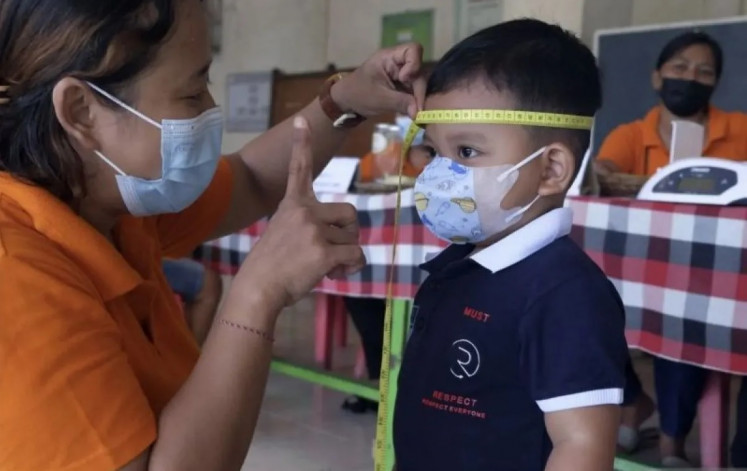Beijing tightens rules for entering city
Thailand reports first death from Omicron variant.
Change text size
Gift Premium Articles
to Anyone

Reuters
BEIJING/Bangkok
Beijing will require travelers to get a COVID-19 test within 72 hours of arrival in the Chinese capital, state media announced on Sunday, a day after the city reported its first Omicron case and as it readies to stage the Winter Olympics next month.
Meanwhile, Thailand has reported its first death from the highly contagious Omicron coronavirus variant, a health official said on Sunday.
On Saturday, Beijing reported the first local infection of the highly transmissible Omicron variant, involving a person who had visited multiple malls and restaurants in the previous 14 days. The person had not left the city since the start of this year.
The new rule, effective from Jan. 22 to end-March, is aimed to help with early detection of Omicron, which is surging globally, and the control of epidemic risks, Beijing Daily, a government newspaper, said on its official social media account.
Already, the capital city requires inbound travelers to take a COVID-19 test within 48 hours of departure for the city and have a green code on the city's health tracking app.
The city and neighboring Hebei province will host the Olympics, which start on Feb. 4, inside a "closed loop" separating athletes and other Games personnel from the general public.
In Tianjin, a neighboring city with close economic ties with the capital that is battling a COVID-19 outbreak involving the Omicron variant, the city found 59 COVID-19 cases in its third round of mass testing starting on Saturday, He Peng, a local government spokesman, told a press conference on Sunday.
So far, local cases of the Omicron variant have been detected in at least five provinces and municipalities, prompting cities to impose curbs to stop its spread and threatening to further undercut slowing economic growth.
China has not said how many Omicron cases it has detected in total.
"It is too soon to conclude that Omicron will swamp China's efforts to suppress COVID," said Mark Williams, chief Asia economist at Capital Economics, in a note issued on Friday.
"But it is clear that the emergence of more transmissible variants is requiring more frequent interventions [...] And the economic toll from this vigilance is mounting."
About 13,000 people have been tested for COVID-19 in the Haidian district where the Beijing case was discovered, but none of the results came back positive, Beijing Daily cited official data as saying on Sunday.
However, some religious sites in the city were already being closed to visitors as a precautionary measure. Lama Temple, a Tibetan Buddhist monastery in central Beijing, said on Sunday it was closing down for an unspecified period because of COVID-19 epidemic and control measures.
Some Beijing residents, concerned about being trapped in the city for the upcoming week-long Chinese New Year holiday, were rushing to travel back home early because of the Omicron case.
"It's worrying that the source of the infection in Beijing remains unclear," said Shelly Fong, who decided to travel back to her home in Liaoning province on Monday. "If there's an outbreak in Beijing, I won't be able to return home."
"What if there's no flights? What if there's a lockdown in Beijing? These are real possibilities."
Outside Beijing Friendship Hospital on Sunday, queues for getting a COVID-19 test left people waiting in line for hours in frigid temperatures.
Mainland China reported 119 new confirmed COVID-19 cases for Jan. 15, including imported infections, down from 165 a day earlier, according to National Health Commission (NHC) data on Sunday.
The new locally transmitted cases were in Tianjin, Henan, Beijing, Guangdong and Shaanxi, NHC said.
There were no new deaths, leaving the death toll at 4,636.
As of Jan. 15, mainland China had 104,864 confirmed cases.
Thailand
The death, a 86-year-old woman from the southern province of Songkhla, came after Thailand detected its first Omicron case last month that led to the reinstatement of its mandatory COVID-19 quarantine for foreign visitors.
"The woman is a bed-ridden, Alzheimer patient," health ministry spokesman Rungrueng Kitphati told Reuters.
Such a death was expected as the country has so far reported over 10,000 Omicron cases, he said, adding that Thailand would not need further containment measures.
Thailand reported 8,077 new infections and nine deaths on Sunday, taking the tally to more than 2.3 million cases and nearly 22,000 deaths since the pandemic started in 2020.
About 66 percent of an estimated 72 million living in the country have received two doses of a COVID-19 vaccines, but about 14.9 percent have received booster shots.
On Jan. 11, the central bank said Southeast Asia's second-largest economy would take a 0.3 percent hit from Omicron, although it should be managed by the first half of the year.









